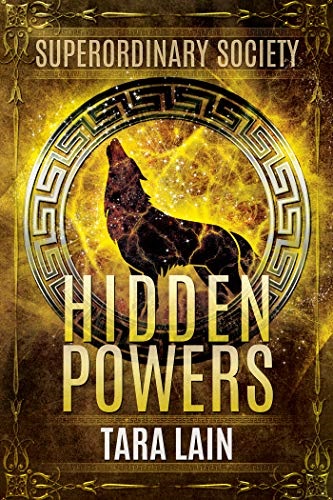 Hidden Powers
Hidden Powers Superordinary Society Book 1
M/M paranormal, young adult
Dreamspinner Press
March 13, 2019
269

Jazz Vanessen is weird—and not just because he’s a werewolf. For most of his life, he’s felt different from his alpha male brothers and friends. Since he’s adopted, he can’t even blame it on family.
Now eighteen, Jazz meets his idol, the social activist Lysandra Mason, and her breathtaking nephew, Dash Mercury. When Dash is around, even stranger things start to happen, including Jazz falling hopelessly in lust. Not only is Jazz having visions, making people disappear, and somehow turning invisible, but somebody’s following him and threatening to reveal his pack’s secrets to the world.
Together with Dash and Jazz’s equally amazing friends—Carla, BeBop, Khadija, and Fatima—they discover the danger is even more lethal than they thought, and Jazz’s weirdness may save all their lives.

Reviewed by: Ulysses Dietz
Member of The Paranormal Guild Review Team
“If your brain explodes and no one can see you, does it still make a mess?”
I handed this book a four-star review, but with an asterisk. It was a fun read, full of fast-paced adventure, vivid characters, and lots of supernatural complications – all centered on the budding romance between two eighteen-year-old boys, neither of whom is actually human.
Jasper, aka Jazz Vanessen, is the adopted child of a human woman and her werewolf husband. He belongs to a small, but rich and thus powerful, pack in Connecticut. His family – his pack – is unusual because it includes both humans and gay men, which are anathema to most wolf packs. All of this makes for some social awkwardness in the werewolf community. But that’s not all: Jazz himself feels weird, beyond the fact that he is clearly an alpha, more powerful than most other wolves. Strange things keep happening to him that are puzzling even to his wolf kinfolk. Since nobody knows who (or what) his parents were, there are questions piling up on a daily basis. Poor Jazz, as if being a teenager weren’t difficult enough.
In the course of a summer internship at his grandfather’s corporate HQ in New York City, Jazz meets up with a group of distinctly unusual teenagers who immediately become his fast friends. One of them, the ethereally beautiful boy with the bizarre name of Dashiell Mercury, seems to have a special connection to Jazz. The intrepid quartet dub themselves the Superordinary Society, and together face challenges that none of them had ever imagined possible.
All in all, it makes for a satisfying read and a great set-up for more books in this series. Jazz himself is apparently a character who appeared in another series, but has been given the starring role in this new one. He is very appealing.
This was the first book by Tara Lain to cross my path, and it’s clear that she has an impressive track record with her readership, including hundreds of reviews for her other books. I have read a good bit of wolf-shifter romance, although it is not something I focus on. I like paranormal and supernatural romance a great deal. I’ve also read a great many gay young-adult novels and appreciate the special requirements for that genre. I know what I like and don’t like, and in terms of the narrative and the plot itself, Hidden Powers pushed most of my happy buttons.
In the end, I knocked a star off this, and put an asterisk on the four stars I did give, because of Lain’s prose style. She is enthusiastic in her writing, but undisciplined. A lot of her story is cluttered with unnecessary adjectives and confusing shifts in its point of view. Nominally told from Jazz’s perspective, the text jumps from person to person, each character expressing inner feelings – usually in a teen-like voice – without any logical shift from one to the other. It is messy and confusing. At the very least it is inelegant. The book feels overall as if a gifted high-school student wrote it and didn’t get any editorial coaching. This happens, even in mainstream publishing houses. Anne Rice’s later vampire books seemed entirely unedited because of her clout as a successful author, and they were nearly unreadable because of it. Dreamspinner should have offered a stronger editorial hand. It would have made this a five-star book.
